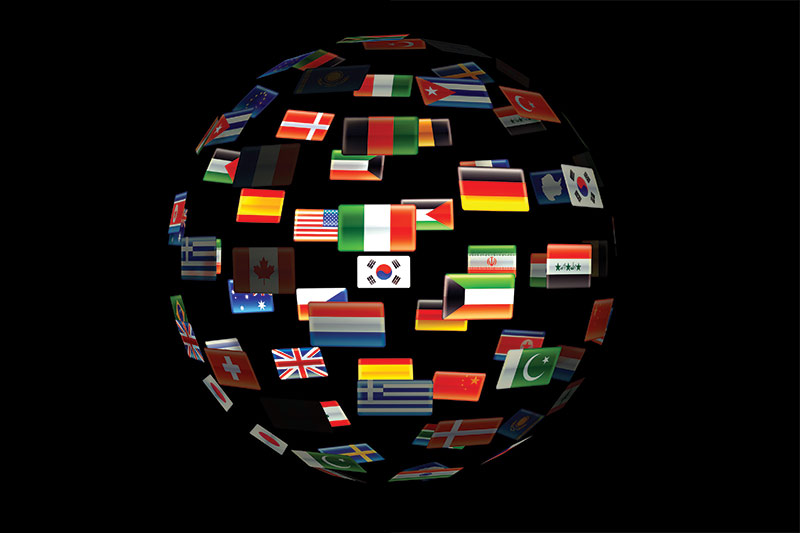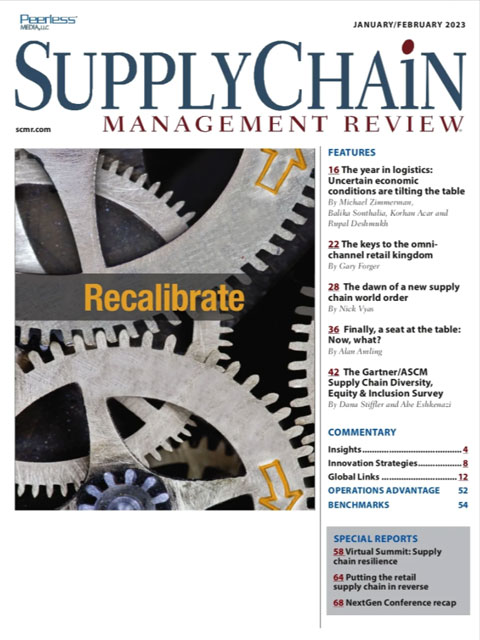Sorry, but your login has failed. Please recheck your login information and resubmit. If your subscription has expired, renew here.
January-February 2023
It feels like a normal holiday season. ”That was the report I got from the VP of global distribution at one of the country’s best known retail brands on the Monday before Black Friday. He added that the last time he felt that way was November of 2019. One of the perks of this job is that I get to talk to a lot of supply chain executives. In my conversations over the last year, I’ve learned two things. Operations, which was perhaps hardest hit at the start of the pandemic, has learned to operate in this new environment. Sure, there are still hiccups caused by absenteeism and inventory shortages. But those are situational—give them supply and… Browse this issue archive.Need Help? Contact customer service 847-559-7581 More options
As a one-time operator of global supply chains, and now an academic who often consults with international firms, I’ve come to a simple conclusion: Students of supply chain management should study international relations as part of their curriculum. They need to acquire an academic ability to deduce the effects of statecraft and international balance of power on their work-life.
That dictum doesn’t only apply to students; industry professionals, particularly those involved with strategic aspects like planning and design, must hone their ability to see through media biases and read geopolitical trends and patterns.
During the last two years, supply chain managers in the United States and elsewhere have continually encountered the direct, outsized influence of international political relations on their lives and work. The catastrophic delay of more than three weeks in the reporting of COVID-19, the deadly lag in the response from authorities in major countries like the United States, Brazil and the UK to the contagion, which partly and critically caused the shortages of lifesaving equipment and hygiene products, chip shortage in one sector and a glut in another, and the global food price inflation and energy crises have all had one factor in common—geopolitical power dynamics. We need to develop the ability to anticipate and predict them in the way that we have devised ways to forecast demand—not only react and change course ex post facto.
Nick Vyas is the founding executive director of the Kendrick Global Supply Chain Management Institute and an associate professor of clinical data science and operations at the Marshall School of Business at the University of Southern California. He is also a frequent contributor to Supply Chain Management Review. He can be reached at [email protected]
To be fair, those of us in the business of supply chain are not political ignoramuses. More than in any other corporate function, except maybe finance, managers in our field develop a keen sense of awareness of the political environment because we often operate globally. It helps us optimize goods movement and resource pricing. The focus, however, is largely attuned to local and national political environments. It now needs to broaden to encompass international affairs. Not just by way of knowing about them, but through formal training in how to apply that knowledge. There are three chief reasons.

This complete article is available to subscribers only.
Log in now for full access or start your PLUS+ subscription for instant access.
SC
MR
Sorry, but your login has failed. Please recheck your login information and resubmit. If your subscription has expired, renew here.
January-February 2023
It feels like a normal holiday season. ”That was the report I got from the VP of global distribution at one of the country’s best known retail brands on the Monday before Black Friday. He added that the last time… Browse this issue archive. Access your online digital edition. Download a PDF file of the January-February 2023 issue.As a one-time operator of global supply chains, and now an academic who often consults with international firms, I’ve come to a simple conclusion: Students of supply chain management should study international relations as part of their curriculum. They need to acquire an academic ability to deduce the effects of statecraft and international balance of power on their work-life.
That dictum doesn’t only apply to students; industry professionals, particularly those involved with strategic aspects like planning and design, must hone their ability to see through media biases and read geopolitical trends and patterns.
During the last two years, supply chain managers in the United States and elsewhere have continually encountered the direct, outsized influence of international political relations on their lives and work. The catastrophic delay of more than three weeks in the reporting of COVID-19, the deadly lag in the response from authorities in major countries like the United States, Brazil and the UK to the contagion, which partly and critically caused the shortages of lifesaving equipment and hygiene products, chip shortage in one sector and a glut in another, and the global food price inflation and energy crises have all had one factor in common—geopolitical power dynamics. We need to develop the ability to anticipate and predict them in the way that we have devised ways to forecast demand—not only react and change course ex post facto.
Nick Vyas is the founding executive director of the Kendrick Global Supply Chain Management Institute and an associate professor of clinical data science and operations at the Marshall School of Business at the University of Southern California. He is also a frequent contributor to Supply Chain Management Review. He can be reached at [email protected]
To be fair, those of us in the business of supply chain are not political ignoramuses. More than in any other corporate function, except maybe finance, managers in our field develop a keen sense of awareness of the political environment because we often operate globally. It helps us optimize goods movement and resource pricing. The focus, however, is largely attuned to local and national political environments. It now needs to broaden to encompass international affairs. Not just by way of knowing about them, but through formal training in how to apply that knowledge. There are three chief reasons.
SC
MR


Latest Supply Chain News
- How CPG brands can deliver on supplier diversity promises
- How S&OP provides the answer to in-demand products
- AI, virtual reality is bringing experiential learning into the modern age
- Humanoid robots’ place in an intralogistics smart robot strategy
- Tips for CIOs to overcome technology talent acquisition troubles
- More News
Latest Podcast

 Explore
Explore
Procurement & Sourcing News
- How CPG brands can deliver on supplier diversity promises
- How S&OP provides the answer to in-demand products
- There is still work to do to achieve supply chain stability
- Blooming success: The vital role of S&OE in nurturing global supply chains
- How one small part held up shipments of thousands of autos
- Shining light on procurement’s dark purchases problem
- More Procurement & Sourcing
Latest Procurement & Sourcing Resources

Subscribe

Supply Chain Management Review delivers the best industry content.

Editors’ Picks






